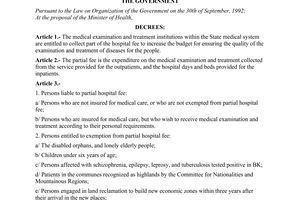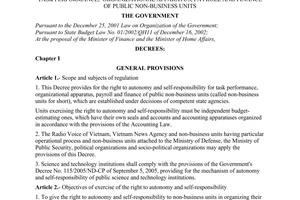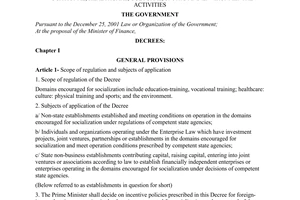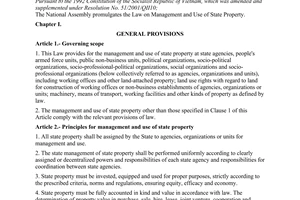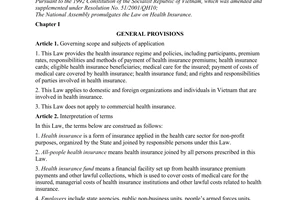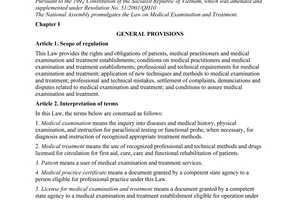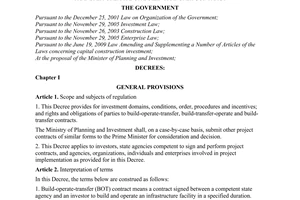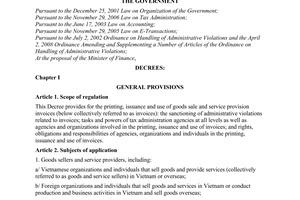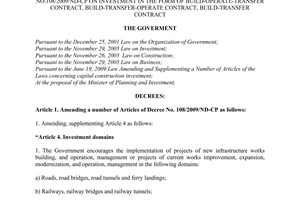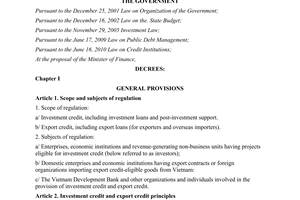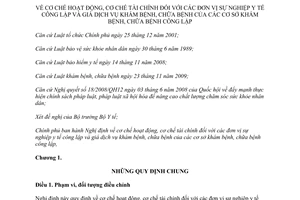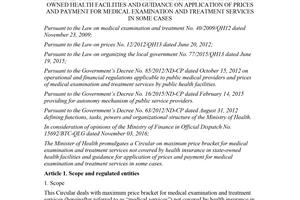Nội dung toàn văn Decree No. 85/2012/ND-CP on the operational and financial regimes applicable
|
THE
GOVERNMENT |
SOCIALIST
REPUBLIC OF VIET NAM |
|
No: 85/2012/ND-CP |
Hanoi, October 15, 2012 |
DECREE
ON THE OPERATIONAL AND FINANCIAL REGIMES APPLICABLE TO PUBLIC HEALTH NON-BUSINESS UNITS AND THE PRICES OF MEDICAL EXAMINATION AND TREATMENT SEVICES OF PUBLIC MEDICAL EXAMINATION AND TREATMENT ESTABLISHMENTS
Pursuant to the Law on Government organization of December 25, 2001;
Pursuant to the Law on people’s health protection of June 30, 1989;
Pursuant to the Law on health insurance of November 14, 2008;
Pursuant to the Law on medical examination and treatment of November 23, 2009;
Pursuant to the Resolution No.18/2008/QH12 of June 03, 2008 of National Assembly, on stepping up implementation of law policies, law socialization in order to improve quality of people’ s health care;
At the proposal of the Minister of Health;
The Government promulgates the Decree on the operational and financial regimes applicable to public health non-business units and the prices of medical examination and treatment sevices of public medical examination and treatment establishments,
Chapter 1.
GENERAL PROVISIONS
Article 1. Scope and subjects of regulation
This Decree prescribes on the operational and financial regimes applicable to public health non-business units and the prices of medical examination and treatment sevices of public medical examination and treatment establishments.
Article 2. Interpretation of terms
In this Decree, the following terms are construed as follows:
1. “Public health non-business unit" means an organization established by a competent state agency and managed in accordance with law, having legal entity, seal, account and its accounting aparatus organized in accordance with law on accunting in order to realize task of provision of public services or to serve state management in health field such as: preventive medicine; medical examination and treatment; nursing and rehabilitation; medical, forensic and mental forensic examination; traditional medicine; pharmaceutical, cosmetic, medical equipment testing; food safety and hygiene; population – family planning; reproductive health; health communication and education (hereinafter abbreviated to medical non-business units).
2. “Superior agencies” mean agencies competent to management over health non-business units: For the health non-business units managed by central level, they include Ministries, Ministerial-level agencies, Governmental agencies; for health non-business units managed by local level, they are the provincial Departments of Health.
3. “Competent persons” mean Ministers, Heads of ministerial-level agencies and Governmental agencies for the health non-business units managed by central level, mean the chairpersons of the provincial People’s Committee for the health non-business units managed by local level.
Article 3. Classification of health non-business units
1. Health non-business units are registered and classified under the following groups:
a. Group 1: Units have the non-business revenue source to self-cover all regular operational expenditure and expenditure for investment and development;
b. Group 2: Units have the non-business revenue source to self-cover all regular operational expenditure;
c. Group 3: Units with non-business revenue source to self-cover partly regular operational expenditure;
d. Group 4: Units with low non-business revenue source or having no revenue or regular operational expenditure under their assigned functions and tasks, so they shall be financed all expenditure by the State budget.
2. The register and classification of health non-business units are stable for 03 years, after 03 years, they shall be considered to reclassify for conformity. If an unit has changes on revenue or expenditure task which cause the basic change of the level to self-cover regular operational funding, it shall be considered for adjustment of classification before term
3. The Ministry of Health shall assume the prime responsibility for, and coordinate with the Ministry of Finance, Ministry of Internal Affairs to guide the register, classification and adjustement of classification of health non-business units specified in this Article.
Chapter 2.
REGULATION ON THE OPERATIONAL REGIME
Article 4. Regulation on organization and operation
1. The health non-business units shall base on their assigned functions and tasks, regulation, provisions in this Decree and the model Regulation on organization and operation of units to formulate their Regulation on organization and operation and report them to their supperior agencies for approval.
2. The Minister of Health shall specify the model content of Regulation on organization and operation in health field.
Article 5. Formulation of the professional operational plan
1. Annually, units shall base on their Regulation on organization and operation, functions, tasks and actual situation to formulate the professinal operational plan.
a. For units of group 1, group 2: units shall formulate the operational plan, including specialized criteria and tasks in their assigned functions and tasks and criteria and service activities; report them to the superior agencies for register, use as basis to monitor, inspect and supervise the implementation;
b. For units of group 3, group 4: units shall formulate the operational plan, including specialized criteria and tasks in their assigned functions and tasks on the basis of their servicing capability, allocated budget and the non-business revenue source, criteria and service activities (if any). The supperior agencies shall assign the operational plan for budget and non-business revenues, units shall self-formulate and register for implementation applicable to sevice activites.
2. The Health non-business units are entitled to proactively decide measures to organize implementation of the specialized operational plans specified in clause 1of this Article in accordance with law regulations and must ensure conditions on human resource, professional operations, material facilities, equipment as prescribed in order to perform and provide for services meeting quality standards.
3. The health non-business units subject to inspection and supervision of competent state management agencies for their whole activities.
4. The Ministry of Health shall formulate and issue professional guides and technical process; stipulate on division of technical professional levels for the medical examination and treatment establishments; stipulate the main profesional tasks of health units in remaining field under professional levels; stipulate and issue criteria to assess result of completed professional tasks.
Article 6. Regulation on joint venture, association and service activities
1. Units are entitled to contribute capital, mobilize capital, perform joint venture, association in accordance with law to expand their establishments, develop services and technique; carry out techniques not in list of assigned techniques and professional task; organize service activities to meet social demands but suitable to their specialized field, capability and in accordance with law. The capital contribution or mobilization, performing joint venture or association must be separately accounted or establish an independent accounting facility.
2. In case of establishing an independent accounting facility in the current precinct of units: Units must formulate Scheme and report to the superior agencies for approval; the independent accounting facilities must be their inferior accounting units, directly be managed, operate under the principle of self-ensuring all regular operational expenditure and investment expenditure and be assigned autonomy and self-responsibility in implementation of specialized tasks, organization of apparatus, payroll and finance in accordance with current regulation.
Article 7. Organization of apparatus; plan on recruitment, management and use of civil servants, public employees
1. Organization of apparatus
a. On the basis of the Regulation on organization and operation has been approved, unit is entitled to decide establishment or re-organization of departments, divisions, and other affiliated organizations in order to perform the specialized action plan which has been registered or assigned by the superior;
b. Units of group 1 must establish a management council in order to decide important issues during their operation. A management council has 09 memebers, including: 01 chairperson, 01 vice chairperson and 07 members. Chairperson is the head of unit, vice chairperson is Party Secretary of unit ( if head of unit is concurrently in charge of Party Secretary, vice Party Secretary will join in); Members of council include: 01 representative of the superior agency in health management; 01 representative of the superior agency in financial management, 02 deputies of head of unit (if unit has only 01 deputy, chief of the planning and summarization division will join in); 01 is president of the union of unit; 02 persons working in health selected according to method of secret ballot by all cadres, public employees specialized in health of unit and graduated from university or higher. The functions, tasks and operational regulation of the management council as prescribed by the Ministry of Health. Ministers, Heads of ministerial-level agencies and Governmental agencies shall decide establishment of management council of central units, the chairpersons of the provincial People’s Committee shall decide establishment of local unit’s management council.
2. Plan on recruitment of public employees
a. The Ministry of Health shall assume the prime responsibility for, and coordinate with Ministry of Internal Affairs in guiding structure of public employees according to professional titles and quantity of public employees in respective of health fields;
b. Annually, unit shall, based on documents guiding on structure and quantity of public employees issued by competent agencies; based on functions, tasks, specialized operational plan, demand of work, position, employment, salary fund of unit, formulate plan on recruitment of public employees, in which clearly state necessary requirements on quantity, quality, structure of public employees of each affiliated organization;
c. For units of group 1, group 2: The head of unit, under his/her jurisdiction, decides plan on recruitment of public employees of unit in order to ensure realization of the specialized operation plan but he/she must report to superior agency for summarizing, monitoring, inspecting and supervising;
d. For units of group 3, group 4: agency or unit competent to appoint, relieve of duty the head of unit shall approve the plan on recruitment of oublic employers of unit;
e. The head of unit is entitled to sign the hiring or lump-sum contracts for affairs that are not necessary to arrange regular labors and other service activities; in entitled to sign labor contracts and other forms of cooperation with foreign and domestic experts, scientists in accordance with law in order to meet specialized requirement of unit.
3. Recruitment, management and use of civil servants, public employees:
a. Head of unit shall review, arrange, allocate and use the existing civil servants, public employees in conformity with their specialized qualification and actual conditions of unit;
b. For units of group 1, group 2: head of unit shall organize recruitment of public employees; decide recruitment of public employees according to examination or selection and take responsibility for her/his decision;
c. For units of group 3, group 4: agency or unit competent to appoint, relieve of duty the head of unit shall conduct decentralization to perform recruitment to head of unit for implementation. Head of unit shall recruit in accordance with law and be responsible for her/his decision. In special case. when a unit fail to be eligible to perform recruitment, it must report agency or unit competent to appoint, relieve of duty the head of unit to perform recruitment;
d. Head of unit is entitled to receive the public employees at the rank of main doctor or equivalent rank or lower;
dd. The recruitment must comply with current law regulations on recruitment of civil servants, public employees;
e. Unit is responsible for structure, minimal quantity of public employees as guided by the Ministry of Health and Ministry of Internal Affairs to meet demand on people’s health care.
4. The appointment, dismissal, reward, discipline of civil servants, public employees shall comply with current regulations of law;
Chapter 3.
REGULATION ON THE FINANCIAL REGIME
SECTION 1. THE FINANCIAL REGIME FOR EXPENDITURE FOR INVESTMENT AND DEVELOPMENT
Article 8. Formulation of master plan on development and investment project
1. Units shall base on: The master plan on development of health system approved by the Prime Minister; the master plan on development of health system within central-affiliated cities and provinces approved by provincial People’s Committees; Regulation on organization and opeartion, the assiged functions and tasks to formulate the master plans on development of units and submit to competent authorities for approval.
2. Units shall, base on their approved development plan, actual conditions on infrastruture, equipment, current regulations, standards, formulate and submit to competent authorities for appraisal, approval of projects on investment in construction new ones, improvement, upgrading in accordance with law.
Article 9. Capital sources to spend for investment in development
1. For units of group 1:
a. The investment credit capital of the Vietnam Development Bank as prescribed in the Government’s Decree No. 75/2011/ND-CP of August 30, 2011, on investment and export credit of State. Loans of other credit institutions in accordance with law;
b. The official development assistance (ODA) capital and capital from foreign non-Governmental organizations (NGO) according to decision of competent authorities (if any);
c. Capital mobilized from organizations, individuals in accordance with law; Units are entitled to mobilize only for investment in projects approved by competent authorities by method of paying interest of which maximal agreement interest rate not exceed 150% of the basic interest rate announced by the State bank of Vietnam at the time of loan;
dd. The fund for development of non-business activities of units;
dd. Other capital in accordance with law;
e. In case units being allocated funding by the State budget for implementation of investment projects as approved by competent authorities, they continue being allocated funding by the State budget for implementation of the projects. Or when need encourage the development of new technique and technology, State is entitled to request the unit joining to implement and support the investment capital under projects approved by competent authorities. Assets after finishing projects are assigned to units for management and use by state as prescribed in Article 11 of this Decree.
2. For units of groups 2, 3 and 4:
a. State finances the investment capital for infrastructure, equipment so that units have enough conditions to implement professional tasks under their assigned functions and tasks; the capital source for investment from: The development investment capital from the State budget; Governmental bond capital; the official development assistance capital, aids from foreign non-Governmental organizations (NGOs); construction lottery source and other lawful capital sources of localities.
The Ministry of Health shall provide standards on infrastructure; list, quantity of health equipment in conformity with scale and health field;
b. The fund for development of non-business activities;
c. Other lawfull capital sources in accordance with law;
d. In case an unit has used the capital sources specified in points a, b and c clause 2 of this Article but fail to meet the progress of projects, works: Unit may borrow the investment credit capital of the Vietnam Development Bank to supplement for investment capital source aiming to early put project, works into operation; may use the expenditure budget for investment in development assigned in following years within term of project performance in accordance with law in order to pay original debt, may include in service price in order to pay the debt of original and interest rates.
The Ministry of Finance shall assume the prime responsibility for, and coordinate with the Ministry of Planning and Investment and the Ministry of Health in guiding specifically on type, criteria, competence to decide on use of expenditure budget for investment in development in order to pay the original debt, guiding the combination and service prices in order to pay original debt and interest rates in this case.
3. In case unit is permitted by competent agency to invest in construction of infrastructure in the existing precinct under forms specified in the Government's Decree No. 108/2009/ND-CP of November 27, 2009 and the Government’s Decree No. 24/2011/ND-CP of April 05, 2011, amending a number of articles of the Decree No. 108/2009/ND-CP of November 27, 2009 on investment in the form of build-operate-transfer contract, build-transfer-operate contract. Build-transfer contracts comply with this Decree and documents guiding implementation.
For investment projects in the form of BOT or BTO in order to operate medical examination and treatment, it depends on unit responsible for implementation of examination and treatment work. Investor and unit may agree on returning capital for project implementation in accordance with law in contract.
4. For hospitals In case competent state agency permits pilot investment under the form of public-private partner, it shall comply with current regulations.
Article 10. Capital sources to spend for investment in development of facilities performing socialization of public health non-business units
1. For independent accounting facilities which self-cover operation expenses in the current precinct of units, the investment capital sources from:
a. The fund for development of non-business activities;
b. Mobilization from civil servants, public employees and employees in units under method of paying fixed interest rate which is agreed maximally not exceeding 150% of the basic interest rate announced by the State bank of Vietnam at the time of loan;
c. The investment credit capital of the Vietnam Development Bank;
d. The capitals from joint-venture, association of organizations, individuals and other lawful capital sources.
2. Units may mobilize capital, borrow capital and use their “capability, quality and prestige” in order to participate in investment to build new health establishments outside of precinct of units in form of capital contribution, interest division according to the rate of contributed capitals with organizations, individuals specified in the Government’s Decree No. 69/2008/ND-CP of May 30, 2008 on incentive policies for the socialization of educational, vocational, healthcare, cultural, sports and environmental activities.
The Ministry of Health shall assume the prime responsibility for, and coordinate with the Ministry of Finance and relevant ministries in guiding the valuation of “capability, quality and prestige” of the public health non-business units.
3. Heads of units must formulate the financial plan (capital mobilization; payment of original and interest for loans), plan on service operation; take responsibility before law on effectiveness of borrowing, mobilizating capitals and service activities in accordance with law.
Article 11. Regarding management and use of assets
1. The public non-business units are assigned assets in accordance with Law on management and use of state assets and documents guiding execution of law.
2. Assets which are invested in construction, procured by money with origin from the State budget (from revenue of charges, fees kept for use of units according to the set regime, from fund for development of non-business activities), from borrowing, mobilizing capital and using funding from revenues, service activities in order to pay debts from capitals borrowed, mobilized, are considered as assets that state has assigned to unit for management and use.
3. Heads of units shall manage, use, organize and ensure fundings for maintainance, repair of assets in order to increase the effectiveness of use and service quality.
SECTION 2. THE FINANCIAL REGIME FOR FUNDINGS TO SPEND ON REGULAR AND IRREGULAR ACTIVITIES
Article 12. The financial source to spend on regular activities
1. The State budget for units of groups 3 and 4 as prescribed in Article 13 of this Decree.
2. Non-business revenue from provision of health services; in which the revenue of medical examination and treatment services comply with regulation in articles 18 and 19 of this Decree.
3. Revenue from provision of goods and services under the mechanism of ordering and assigning task of provision of public non-business services.
4. From part allowed keeping from collected charges and fees of the State budget in accordance with law.
5. amounts which the independent accounting establishments of units deducted and submitted under regulation on internal expenditure, the divided income of establishments stated in clause 2 Article 10 (if any) after finishing obligations with the State budget.
6. Other collected amounts in accordance with law (if any);
Article 13. Assurance for regular activities by the State budget
1. For units performing task of medical examination and treatment (except establishments performing task of medical examination and treatment for leprosy, mental disease) of group 3, group 4:
a. In 2013, the State budget further covers like as 2012 and fundings to spend on regime on special allowances still have not yet been calculated into the prices of medical services, fundings to perform new regimes and policies provided by state in principle of ensuring that the medical expenditure growth is higher than the general average expenditure growth of the State budget specified in the Resolution No. 18/2008/QH12, of June 03, 2008 of National Assembly;
b. During 2014-2015: the State budget covers for:
- Expenses to regularly maintain repair fixed assets which have not yet been included in the prices of services of medical examination and treatment.
- Expenses for salary, allowances of all kinds, contributions in accordance with current regulations (hereinafter referred to as the basic salary fund): Budget covers 100% of the basic salary fund for hospitals of district level, 70% of the basic salary fund for hospitals of provincial level in mountainous areas, highlands and hospitals of district level in Hanoi and Hochiminh city, 50% of the basic salary fund for hospitals of central level and the remaining central-affiliated cities and provinces;
c. During 2016-2017: State budget covers 50% of the basic salary fund for hospitals of district level, the remaining hospitals are included 100% of the basic salary fund and expenses for regularly maintaining, repairing fixed assets in the prices of services of medical examination and treatment;
dd. The support levels from budget specified in point b, point c of this clause are calculated commonly for the medical examination and treatment of Ministries, sectors and localities. Base on actual situation, Ministers, Heads of ministerial-level agencies decide the specific assurance level for the medical examination and treatment facilities managed by the Central; the chairpersons of the provincial People’s Committees decide or submit to competent authorities to decide the specific assurance level for the medical examination and treatment facilities managed by the localitilies.
2. For units performing task of medical examination and treatment, nurturing patients suffering leprosy, mental disease: The State budget covers all expenses for regular activities of such units under the mechanism of ordering and assigning task of provision of public non-business services on the basis of quantity of subjects and expenditure level for types of subjects being served by units.
The Ministry of Health shall assume the prime responsibility for, and coordinate with the Ministry of Finance to promulgate the expenditure level for medical examination and treatment, nurturing patients suffering leprosy, mental disease.
3. For units performing task of preventive medicine (included the communal health stations).
a. The State budget finances the regular activities of units to perform tasks assigned by the State, including:
- Expenditures for human resource: They are defined on the basis of quantity of working positions assigned by competent authorities and basic salary, allowances, payable amounts according to current regulations of regimes, policies for public non-business units; and adjusted in case the State adjusts the policies on salary, allowances or quantity of working position of units.
- Expenditures to operate and assure for the regular activities of units according to the current State budget index such as: Expenditures to pay public services, office materials, propagation, communication, conferences, working-trip allowances, hiring, repairing assets to serve specialized affairs and maintain, repair infrastructure, specialized operations of regular inspection and supervision of situation of epidemic, and other reasonable expenditures. These expenditures are calculated and assigned for units on the basis of quantity of employment position assigned by competent authorities or on the basis of population in localities and included model of epidemic, natural conditions of localities where units in charge of and the average expenditure norm for each type of unit.
- Expenditures for prevention and combating against epidemic: These expenditures are calculated and assigned for units in order to perform prevention and combating against epidemic.
Ministers, Heads of ministerial-level agencies and Governmental agencies shall promulgate the norm of the State budget allocation to their affiliated units.
The chairpersons of the provincial People’s Committees shall decide or submit to competent authorities to decide the norm of budget allocation according to number of people or number of employment positions and typical specialized operations, as the basis for allocation and assignment of annual estimation to units;
b. In case units organize collection of charges, fees: Expenditures to finance regular activities of divisions performing task of collection of charges and fees comply with the current provisions of Ordinance on charges and fees.
4. For typical specialized health non-business units such as: Centers of food safety and hygiene, centers of population and family planning of district level, centers of reproductive health care; centers of health communication and education; units in charge of task of forensic examination, mental forensic examination, medical examination; units in charge of testing, international medical quarantine; centers of prevention and combating against social diseases, other centers of the medical system: The State budget finances all expenses of regular activities for tasks assigned by the State under the mechanism of ordering and assigning task of provision of public non-business services.
5. For units are classified as units self-ensure a part of regular operation expenditures according to the Government’s Decree No. 43/2006/ND-CP on providing for the right to autonomy and self-responsibility for task performance, organizational apparatus, payroll and finance of public non-business units, if such units are transferred to group 1 or group 2 for realization by decision of competent agencies, they are considered to get once funding support at the beginning of year performing transfer with the maximum level equal to the regular expenditure level assigned for autonomy to unit in the preceding year of transfer year.
Article 14. The autonomy on collectible amounts and levels
1. For services of medical examination and treatment providing for patient, including patients with health insurance card: Complying with provisions in Article 19 of this Decree.
2. For charges, fees: Collecting fully and properly under the collectible levels and subjects as prescribed by competent state agencies.
3. For goods and services which are ordered by competent agencies, the collectible levels comply with prices prescribed by competent state agencies; in case they have not yet prescribed by competent state agencies; the collectible levels are defined on the basis of expenditure estimation which have been approved by the finance agencies at the same level.
4. For service activities not in the assigned functions and tasks, performed according to contracts, agreements with foreign and domestic organizations or individuals, activities of joint-venture, association specified in Article 6 of this Decree, activities of units specified in Article 10 of this Decree (except for services of medical examination and treatment complying with provision in Article 19 of this Decree): Units are entitled to decide the collectible amounts and levels in principle of ensuring the expense offset and accumulation. Units must open accounting book in order to monitor and make separately accounting for revenue, expenses and perform full obligation with the State budget in accordance with regulation.
Article 15. The autonomy in use of financial source spending on regular activities
1. Units may be initiative to use the finance source spending on regular activities specified in Article 12 of this Decree in order to spend on regular activities under their functions, tasks; spend on collecting charges and fees; spend on service activities (including spend on implementation of obligations with the State budget, spend on payment of loans, loan interests) according to the following regulation:
a. The collectible amounts from depreciation of fixed assets are accounted in Fund developing non-business activities in order to maintain, repair fixed assets, invest in upgrading infrastructure, procurement of equipment serving for specialized activities. The collectible amounts from depreciation of assets formed from loans, mobilized capitals are used to pay the original, interests under the contracts of capital borrowing and mobilization;
b. For contents of spending on management, specialized activities of which expenditure levels have been prescribed by competent state agencies: Units may decide an expenditure level higher or lower than the expenditure level provided in the internal expenditure regulation of units, but they must be suitable with the financial capability of units. For standards, norms on use of cars, working houses, equipping telephones for public affairs at private houses, the overseas working-trip allowances, reception of foreign guests: Units are not permitted to decide an expenditure level higher than the level provided by state;
c. For contents of spending on management, specialized activities of which expenditure levels have not yet been prescribed by competent state agencies: Units may base on the actual condition, technical specialized process in order to formulate and promulgate the eco-technical norms and expenditure norms for conformity in the principle promulgated in the internal expenditure regulation and must be responsible for their decision;
d. Basing on the financial capability and actual situation, the heads of units may decide to use a part of funding source for annual regular expenditures and a part from the Fund for development of non-business activities for training and improving the skilled qualification of contingent of cadres, civil servants, public employees, procurement of equipment, overhaul of houses, infrastructures aiming to strengthen the serving capability and increasing the service quality;
e. Basing on nature of work, heads of units are entitled to decide the method of expenditure package to each divisions, affiliated units aiming to use expenditure in thrift and effectiveness.
2. The difference part of revenues more than expenditures (if any) is used as follows:
a. For units of groups 1, 2:
- Deducting at least 25% for the development fund of non-business activities;
- Performing appropriation for the Fund of added income and provision for income stability;
- Performing appropriation for the Rewarding Fund, welfare Fund;
- Performing appropriation for Fund supporting the medical examination and treatment applicable to units in charge of the medical examination and treatment task.
b. For units of groups 3, 4:
- Deducting at least 25% for the development fund of non-business activities; For unit has difference of revenues more than expenditures that is less than once of the salary fund under grades, ranks and titles in year, it may deduct at least 15%;
- Performing appropriation for the Fund of added income in order to pay the added salary, pay for subjects being experts and good doctors. Total year revenues of units of group 3 maximally not exceed 03 times of the salary fund under grades, ranks and titles provided by state; of units of group 4 maximally not exceed twice of the salary fund under grades, ranks and titles provided by state;
- Performing appropriation for the Fund of provision for income stability in order to assure for incomes of employees in case their incomes are reduced;
- Performing appropriation for the Rewarding Fund, welfare Fund with the maximum level of both funds not exceed the realized average 03-month salary, wage and added income in year;
- Performing appropriation for Fund supporting the medical examination and treatment applicable to units in charge of the medical examination and treatment task.
c. The appropriation levels of funds are decided by heads of units in accordance with the internal expenditure Regulation of unit and provisions in this Article. After performing appropriation for Funds mentioned above, if they are still in excess, the residue is supplemented in the development fund of non-business activities;
d. The Fund supporting the medical examination and treatment is used to support for cases where costs for treatment of patients are big, patients have no capability to pay and used to pay for cases of professional risks during the medical examination and treatment.
Article 16. Regulation on irregular fundings
The State budget shall, depend on functions and tasks of units, finance their irregular activities, including:
1. Funding for performance of the assigned science and technology tasks.
2. Funding for performance of tasks on prevention and fighting against epidemics (for units not being preventive medicine units).
3. Funding to carry out the task of directing levels, to perform the scheme on satellite hospital, perform the regime on rotation with defined term applicable to the practice persons as prescribed by Law on medical examination and treatment.
4. Fundings to perform projetcs of the National objective programs.
5. Fundings to perform task of training and improving for cadres, public employees (if any).
6. Fundings to perform tasks which are irregularly assigned or ordered by the competent state agencies (investigation, zoning, survey, etc).
7. Fundings to perform policy on downsizing according to regime provided by state (if any).
8. Fundings for procurement of working equipment, devices and other fixed assets, overhaul of fixed assets serving non-business activities under projects approved by competent authorities and assigned estimation to units for performance but not in association with projects used capital sources for investment in development.
9. Fundings to perform projects on the basis of loans and aids according to projects approved by competent authorities, including reciprocal capital.
10. Fundings for performance of other irregular tasks assigned by competent agencies.
Article 17. Management and use of irregular fundings
1. The irregular fundings are allocated and assigned estimation to units according to the anual assigned tasks.
2. Units shall manage, use, spend, and make finalization in accordance with regulation of the Law on State budget and documents guiding performance for each assigned funding source; not permitted to use for calculation of difference between revenue and expenditure and appropriation of Funds.
Chapter 4.
REGULATION ON PRICES OF THE MEDICAL EXAMINATION AND TREATMENT SERVICES
Article 18. Prices of the medical examination and treatment services
The price of medical examination and treatment service are the payable amount for each medical examination and treatment service and comply with the following roadmap:
1. 2013: The price of medical examination and treatment service is calculated on the basis of the following direct expenses:
a. The drugs, chemicals, consumable materials, replacing materials for performing service (including expenses for preservation, loss within norm provided by the competent agencies);
b. Electricity, water, fuel, handling of waste and environmental hygiene directly for performance of service;
c. Maintaining, repairing equipment, sale and replacing instruments, tools which are directly used for performance of service;
d. Expenses to pay for the standing allowances, expenses to pay for allowances of surgery and operation.
2. 2014-2017: The price of medical examination and treatment service is calculated on the basis of the following direct expenses:
a. Expenses specified in clause 1 this Article;
b. Expenses on salary:
- 2014 – 2015: just calculating 30% of the basic salary fund for provincial hospitals in mountainous areas, highlands and hospitals of district level in Hanoi and Hochiminh city, 50% of the basic salary fund for hospitals of central level and the remaining central-affiliated cities and provinces;
- 2016 – 2017: calculating 100% of the basic salary fund for the provincial, central hospitals and hospitals of district level in Hanoi and Hochiminh city, 50% of the basic salary fund for the remaining district hospitals;
c. Expenses for outsourced workers (if any). These typical expenses maximally not exceed 50% of expenses for salary of service subject to pay wage aiming to encourage and attract experts and good doctors to work in units;
d. Depreciation of fixed assets being machines, equipment directly user for performance of service according to the regime applicable to state enterprises; expenses for interests under contracts of capital borrowing and mobilization for investment, procurement of equipment in order to perform service (if any): Being calculated and allocated into expenses of services which use these capital sources;
e. Indirect expenses, other lawful expenses to operate and ensure normal activities of hospitals.
3. Period from 2018 and later, the price of medical examination and treatment service is calculated all expensives to perform service, including:
a. Direct expenses:
- Expenses of drugs, chemicals, consumable materials, replacing materials (including expenses for preservation, loss within norm provided by the competent agencies);
- Expenses of electricity, water, fuel, handling of waste and environmental hygiene;
- Salary, allowances, payable amounts under regimes; expenses of hiring oursourced workers; typical expenses maximally not exceed 50% of expenses of salary for service;
- Expenses for maintaining, repairing fixed assets, procurement to replace instruments, tools directly used for performance of technical services;
- Depreciation of fixed assets according to the regime applicable to state enterprises; expenses for interests under contracts of capital borrowing and mobilization for investment, procurement of equipment in order to perform service (if any): Being calculated and allocated into expenses of services which use these capital sources;
b. Indirect expenses:
- Expenses of indirect divisions, other lawful expenses in oreder to operate and ensure normal activities of hospitals;
- Expenses of training, scientific study in order to apply new techniques.
4. Expenses on salary are calculated in the following principles: For services which have the salary unit price in unit price of service approved by competent agencies, they may calculated according to the approved salary unit price. For services which have not yet provided the salary unit price in unit price of service, the expenses on salary are calculated on the basis of labor consumption and the average salary for performance of service.
5. Prices of the medical examination and treatment services for units of group 1, group 2, and facilities performing socialization of the public health non-business units are calculated full cost elements specified in clause 3 of this Article and have accumulation for investment in development. The maximal accumulation not exceed 10% of service expenses and supplemented in the development fund of non-business activities of units.
Article 19. Competence to prescribe and decide the prices of medical services
1. Prices of medical examination and treatment services are calculated according to each medical service, technique or calculated according to case of disease.
2. The Ministry of Health shall assume the prime responsibility for, and coordinate with the Ministry of Finance in prescribing the price framework of the medical examination and treatment service in case of payment under service; the price framework of each type of disease, group of disease in case of payment under disease case, including:
a. The price framework calculated according to the roadmap specified in Article 18 of this Decree;
b. The price framework which calculated full elements of expenses and has accumulation specified in clause 5 Article 18 of this Article.
3. For prices of health services which are assigned or ordered by state, complying with regulation in the Decision No. 39/2008/QD-TTg of March 14, 2008 of the Prime Minister, issuing the regulation on bidding, placement of orders for, and assignment of the provision of, public non-business services funded with the state budget.
4. Prices of the medical examination and treatment services are considered to regulate in cases:
a. The competent state agencies change the eco-technical norm of the medical examination and treatment services;
b. state changes on regime, salary policy;
c. When the input elements have changes on price.
5. The specific competence to prescribe the prices of medical examination and treatment services for the medical examination and treatment establishments of state comply with the current provisions.
6. The state agencies competent to prescribe on prices of the medical examination and treatment services shall, base on provisions in Article 18, Article 19 of this Decree and actual conditions, decide adjustment level of the health service prices and time of adjustment of the health service prices for conformity.
Article 20. Regulation on subjects and methods of payment of expenses for the medical examination and treatment
1. When using the medical sevices of public non-business medical examination and treatment establishments, all individuals, organizations (including foreigners on business trip, working, learning, going tourist, transiting in Vietnam’s territory) must pay expenses according the the price levels of service and quantity of used services, of which:
a. For persons with health insurance card: The health insurance Fund shall pay their expenses of medical examination and treatment to the medical examination and treatment establishments according to the levels prescribed by law on health insurance. The patient shall pay the difference part between expenses of medical examination and treatment and the level paid to the medical examination and treatment establishments;
b. For persons without health insurance card: They must pay expenses of the medical examination and treatment to the medical examination and treatment establishments, except subjects specified in clause 2 of this Article;
c. Foreigners being citizen of countries which have concluded International treaties on medical examination and treatment with Vietnam, the expenses of medical examination and treatment will be applied in accordance with provisions of those International treaties.
2. State pays expenses of medical examination and treatment at the public non-business medical examination and treatment establishments for the following subjects:
a. Persons who are forcible to be treated disease as prescribed in Article 66 of the Law on medical examination and treatment;
b. The persons suffering leprosy and persons suffering some diseases under Decision of competent authorities;
c.Patients in cases of natural disasters, serious disaster under Decisions of Ministers, Heads of Governmental agencies, when they are cured at the medical examination and treatment establishments managed by Central; under Decisions of the chairpersons of the provincial People’s Committees when they are cured at the medical examination and treatment establishments managed by localities.
3. Methods of payment:
a. Payment according to the prices of service means payment based on price of each health service and technique prescribed for the public non-business establishments and expenses for drugs, chemicals, consumable materials, replacing materials which are used by patients;
b. Payment according to the disease case means payment according to the average expense level for each type of disease or specific group of disease which has been diagnosed.
The medical examination and treatment establishments are encouraged to perform payment according to the disease case. The Ministry of Health shall formulate the roadmap which by 2020, most of types of diseases or groups of diseases will be paid according to this method.
Article 21. Management and use of revenues from the medical examination and treatment services
1. All revenues from the medical examination and treatment services in the scope of price framework promulgated by the Ministry of Finance and the Ministry of Health as prescribed in this Decree are kept for use of units and not record in the State budget.
2. Units shall open accounts at State Treasuries in order to monitor and manage expenditure, finalization of revenues from the medical examination and treatment services in accordance with current regulations; may open accounts specialized in collecting from the health services at commercial banks which bank may collect on behalf of units but every 5 working days, these revenues must be transferred to accounts of unit at State Treasuries for monitoring, managing expenditure and finalizing.
3. For revenues from service activities of independent accounting establishments specified in Article 6 of this Decree: Units may open accounts at commercial banks for monitoring and management but when using, they must transfer revenues to their accounts at State Treasuries for managing the expenditure and finalization.
4. Units must use invoices, receipts as prescribed in the Government’s Decree No. 51/2010/ND-CP of May 14, 2010 providing for goods sale and service provision invoices and the current guiding documents.
Chapter 5.
OTHER REGULATIONS
Article 22. Payment of salaries, wages and added incomes
1. Units shall ensure the basic salary under grades, ranks, titles and the minimum wages prescribed by state for employees.
2. Units shall base on the Fund of added income to decide the levels to pay for added incomes in the internal expenditure Regulation, in principle that if a person has a high work productivity, quality, effectiveness, many contributions for finishing the specialized tasks of unit, he/she will be payed higher wage, have a adequate remuneration in order to encourage and attract experts and good doctors to work for units, not limit the maximum private income of employees.
Article 23. Sources to ensure the salary policy
1. For units of groups 1 and 2: from revenues of units as prescribed in Article 12 of this Decree.
2. For units of groups 3 and 4: from revenues of units and support of state. State ensures budget for paying salary, including the increased salary according to the roadmap of reforming salary for units in fields of preventive medicine, food safety and hygiene, population; family planning; the remaining units, after these units have used revenues but still fail to ensure, these units will be considered and supplemented from the State budget in order to ensure payment of salaries, allowances and contributions according to the current regime for employees.
Article 24. Regulation on obligations with the State budget
1. Units shall perform obligations with the State budget in accordance with current regulations.
2. For the independent accounting establishments of public health non-business units meeting conditions, criteria, scale as prescribed by Government on incentive policy for facilities performing socialization activities: Being enjoyed incentive policies on tax like enterprises operating in the health field.
Article 25. Some other regulations
1. People’s Committees of central-affiliated cities and provinces shall submit to the provincial People’s Councils to increase expenditures of local budget for health field according to the Resolution No. 18/2008/QH12 od June 03, 2008 of National Assembly, ensuring that the growth of expenditures for health budget is higher that the average growth of common expenditures of the State budget; save at least 30% for the preventive medicine sector; allocate budget for health establishments in order to perform the rotation regime with defined terms as prescribed by Law on medical examination and treatment.
2. The People’s Committees of central-affiliated cities and provinces shall consider and propose to the provincial People’s Councils for decision on promulgation of mechanisms and policies on preferential treatments, facilitating to have houses and employment in order to attract medical officers, especially doctors, pharmacists, who have just graduated, to work at the public health non-business units managed by localities.
3. Heads of medical examination and treatment establishments are responsible for ensuring drugs, chemicals, consumable materials, replacing materials according to the list prescribed by the Ministry of Health in use for patients, not let patients to self-buy, publicize the prices of medical examination and treatment services for the people to be informed and select. Take responsibility before law for collection, management and use of revenues of their units.
4. Strictly prohibit the medical establishments, civil servants, public employees for collecting additional money from patients not according to the prices prescribed by competent agencies, for prescribing the medical techniques inconsistently with guidance on technical process and treatment guidance. Cases of violation will be handled as prescribed by law.
Chapter 6.
IMPLEMENTATION ORGANIZATION
Article 26. Effect
This Decree takes effect on December 01, 2012 and replaces the Government's Decree No. 95/CP of August 27, 1994, on collection of partial hospital fee.
The previous provisions of Government, The Prime Minister, Ministries, Ministerial-level agencies and localities which are contrary to this Decree are hereby annulled.
Article 27. Implementation provision
1. The Minister of Health shall assume the prime responsibility for, and coordinate with the the Minister of Finance, Minister of Home Affairs in guiding to implement this Decree.
2. The Minister of National Defense, Minister of Public Security shall base on provisions in this Decree to specify implementation for the public health non-business units under their jurisdiction.
3. Ministers, Heads of ministerial-level agencies, Heads of Governmental agencies, the Presidents of the People’s Committee of central-affiliated cities and provinces shall implement this Decree; direct and organize guidance, regularly organize inspection and supervision over the public health non-business units within their management in execution of provisions on this Decree.
|
|
ON BEHALF OF
THE GOVERNMENT |
------------------------------------------------------------------------------------------------------
This translation is made by LawSoft and
for reference purposes only. Its copyright is owned by LawSoft
and protected under Clause 2, Article 14 of the Law on Intellectual Property.Your comments are always welcomed

